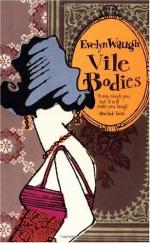|
This section contains 7,291 words (approx. 25 pages at 300 words per page) |

|
SOURCE: "Evelyn Waugh and Humour," in Evelyn Waugh: New Directions, London: Macmillan, 1992, pp. 112-32.
In the following essay, Blayac explains the classical meaning of "humor," rooted in the theory of the four humors of the human body, and applies it to Waugh's novels.
Humour, English humour, has always been a subject of interest (and puzzlement) for the French who have always had the utmost difficulties in understanding their neighbours, hence the number of French essays devoted to the analysis and explanation of the concept. Across the Channel, the notion strikes deep roots in the British collective unconscious. Born of the medical 'theory of humours', it still prevailed during the Renaissance. Initiated by Hippocrates, theorised by Galien, it referred to the four fluids of the human body: blood, phlegm, yellow bile and black bile. Physical diseases, as well as mental and moral temperaments, were the result of the relationship...
|
This section contains 7,291 words (approx. 25 pages at 300 words per page) |

|


